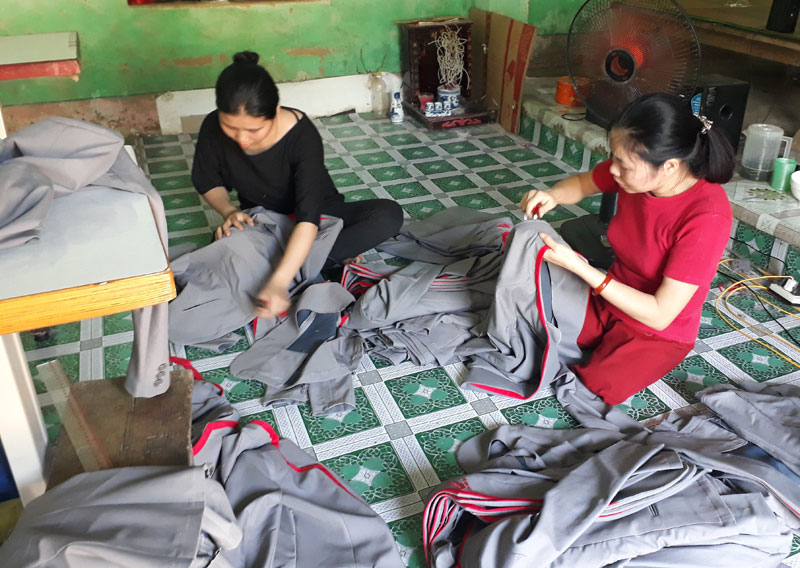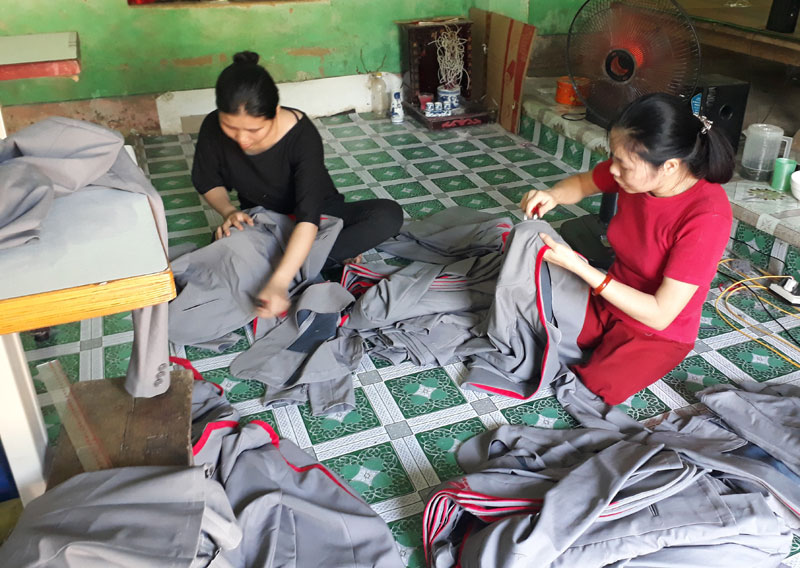
(HBO) – She unfortunately lost her legs by the destiny fate. But with her effort, she has struggled to show that people with disabilities can do things as normal people. At present, she is the owner of a garment factory and creates jobs for many women in the village. The person we want to mention is Ms. Bui Thi Mien (born in 1978), a tailor who lives in Chanh village, Vinh Dong commune (Kim Boi).

Ms. Bui Thi Mien (right) is inspecting the
product before delivery.
In 2001, through the radio of the family that
Ms. Mien often heard, she had her own orientation to choose her work. At the
beginning of the study, she met a lot of difficulties, due to losing her legs,
she had to walk by her knee pads, pressing the pedal by thigh, which took
her half of a month to master. Sometime,
she was too passionate to study, the thighs were reddish with blood without
knowing. She just thought she would do it, so that she was no longer a burden
for her family. With the help and guidance of staff of the Vocational Training
Center, after 6 months, she was out of work and paid for the product. Holding
the first money on her hand made her emotional.
After 2 years working in the garment industry
in the Center, she would like to move out and try to work for the company and
factory. In these places, Ms. Mien has improved her experience and skills in
sewing, helping to improve her skills. With diligence, fun and always in
harmony with people, she is loved by everyone.
With 8 years of learning and working, she has
saved some capital and desire to return home to open a small workshop at home
to help the same people rise up. In early March, 2018, with the permission of
the local government for her to rent a cultural house of Chanh village with the
price of 100,000 VND per month, she invested 7 sewing machines, 2 overcasting
machines with the cost of about 30 million VND. Despite its new operation, her
garment factory has many orders, the main item is the uniform clothes. At
present, her workshop has 8 tailors with a fixed rate basing on products at 2.5
- 3.5 million VND/ person / month. In addition, Ms. Mien also provides free
vocational training for women in need. So far, she has taught for over 10
people.
The emulation movement "Hoa Binh joining hands to build new-style rural areas” has been widely spreading, becoming a driving force that motivates the localities to renew rural landscapes and improve the material and spiritual lives of the residents. In this movement, the people play a central role-both as the main implementers and direct beneficiaries of its outcomes.
In response to the global digital revolution, Hoa Binh Newspaper is transforming itself into a modern and multi-platform media hub, blending cutting-edge technology with a restructured newsroom and a new generation of tech-savvy journalists.
Hoa Binh province’s Association of the Elderly recently held a conference to review the project on expanding the inter-generation self-help club model until 2025.
In a move to implement Resolution No. 57-NQ/TW, issued on December 22, 2024 by the Politburo, which targets breakthroughs in science-technology development, innovation, and digital transformation, the Hoa Binh provincial Department of Health has issued a plan to roll out the "Digital Literacy for All” campaign within the local health sector.
An Nghia Commune (Lạc Sơn District) is one of the communes that achieved the tha standard of the national new rural area in 2018. Entering a new development phase, the commune is now trying to meet the criteria for the advanced new rural development. With the strong political will and the public consensus, the commune is gradually overcoming the challenges to reach this goal, aiming for the sustainable development.



